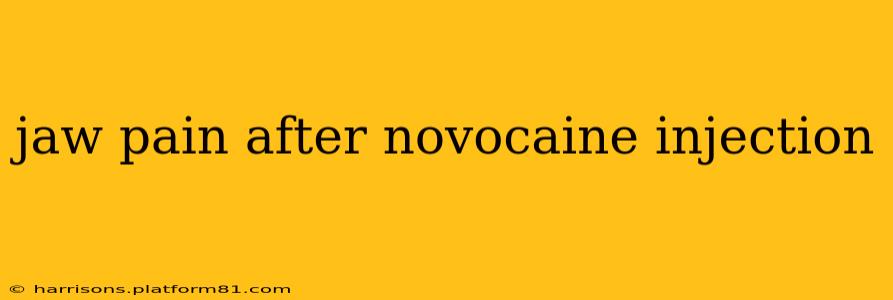Experiencing jaw pain after a novocaine injection is a common concern for many dental patients. While the numbing effect of novocaine is intended to alleviate discomfort during procedures, some individuals may experience lingering pain or discomfort in the jaw afterward. Understanding the causes, potential treatments, and preventative measures can help alleviate anxiety and ensure a smoother recovery.
This comprehensive guide will explore the various reasons behind this post-injection jaw pain, providing practical advice and insights to help you manage and potentially prevent this issue.
Why Does My Jaw Hurt After a Novocaine Injection?
Several factors can contribute to jaw pain after a novocaine injection. It's important to differentiate between the expected temporary numbness and actual pain. The most common reasons include:
- Injection Site Irritation: The injection itself can cause minor inflammation and irritation at the injection site. This is often a temporary issue that resolves within a day or two.
- Muscle Tension: The anxiety associated with dental procedures can lead to clenching or grinding of teeth, causing jaw muscle tension and subsequent pain. The injection site may also add to this tension.
- Nerve Irritation: While rare, the injection needle can sometimes inadvertently irritate a nerve, leading to prolonged pain or discomfort. This is typically localized to the area of the injection.
- Referred Pain: Pain felt in the jaw could be referred pain from another source, such as a temporomandibular joint (TMJ) disorder or a problem with the sinuses.
- Infection: In rare cases, an infection at the injection site can occur, resulting in more significant pain and other symptoms like swelling and redness. This requires immediate medical attention.
- Underlying Conditions: Pre-existing conditions affecting the jaw or surrounding tissues can exacerbate the pain following an injection.
How Long Does Jaw Pain After Novocaine Last?
The duration of jaw pain after a novocaine injection varies depending on the cause and individual factors. In most cases, any mild discomfort related to injection site irritation or muscle tension should subside within 24-48 hours. However, if the pain persists beyond a couple of days, or if it is severe, it is crucial to seek professional advice.
What Can I Do to Relieve Jaw Pain After a Novocaine Injection?
Managing post-injection jaw pain often involves simple, at-home remedies:
- Ice Packs: Applying ice packs to the affected area can help reduce inflammation and numb the pain. Use ice packs for 15-20 minutes at a time, several times a day.
- Over-the-Counter Pain Relievers: Nonsteroidal anti-inflammatory drugs (NSAIDs) like ibuprofen or naproxen can effectively manage mild to moderate pain and inflammation. Always follow the recommended dosage instructions.
- Gentle Massage: Gently massaging the jaw muscles can help relieve tension and promote relaxation.
- Warm Compress (after 48 hours): After the initial 48 hours, a warm compress might provide more relief than ice. This helps increase blood flow to the area promoting healing.
- Rest and Relaxation: Avoid strenuous activities that could exacerbate the pain. Resting and avoiding excessive jaw movement can aid in recovery.
Is Jaw Pain After Novocaine Normal?
Mild, temporary jaw pain following a novocaine injection is relatively common and usually nothing to worry about. However, severe, persistent, or worsening pain is not normal and should be addressed by a dentist or doctor.
When Should I See a Doctor About Jaw Pain After a Novocaine Injection?
Consult your dentist or doctor if:
- The pain is severe or persistent (lasting more than a few days).
- You experience swelling, redness, or other signs of infection at the injection site.
- The pain is accompanied by other symptoms like fever, chills, or difficulty opening your mouth.
- You suspect the pain may be related to an underlying medical condition.
How Can I Prevent Jaw Pain After Novocaine?
While not all instances of jaw pain are preventable, taking the following steps can reduce the risk:
- Communicate with your dentist: Discuss any concerns or previous experiences with jaw pain before the procedure.
- Relaxation techniques: Practice relaxation techniques before and during the procedure to minimize muscle tension. Deep breathing exercises can be very helpful.
- Follow post-procedure instructions: Carefully follow your dentist's instructions for post-operative care.
This information is for general knowledge and does not constitute medical advice. Always consult with a healthcare professional for any health concerns or before making any decisions related to your health or treatment.
